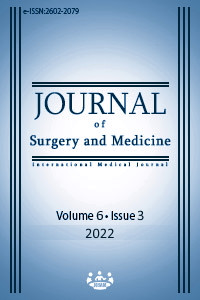Nurses' assessment of nutrition awareness in the critical patient
Keywords:
Malnutrition, Enteral Nutrition, Parenteral Nutrition, NurseAbstract
Background/Aim: Healthcare professionals need sufficient knowledge and practice regarding nutrition in terms of early diagnosis and treatment of malnutrition. This study aims to investigate and evaluate nurses' awareness and knowledge of nutrition among critical patients. Methods: In this cross-sectional study, the knowledge levels of the nurses (n: 55) who have worked for at least two months in the intensive care or palliative service were measured using the Nurses' Nutrition Support Awareness Questionnaire for the Critical Patient, and the answers were statistically evaluated and interpreted. Results: Nurses’ average age was 27.7 and 21.8% of them were men and 78.2% were women. In terms of education status, 16% of them were high school graduates, 33% had associate degrees and 51% were university graduates. In addition, 76% of the nurses had more than two years of professional experience. According to the rate of correct answers in the questionnaire, the level of knowledge about starting nutritional support with the evaluation of the patient, the way and route of TPN administration, and the products and drugs that can be given together were evaluated as “good” with scores of 80-84%. The level of knowledge about the time to start support for the patient with insufficient oral intake, which products were preferred initially, the way to administer enteral products, and the duration of consumption were evaluated as "medium" with 60-65%. Nurses scored 40-50% on fluid support and feeding the patient without swallowing reflex, which was deemed “insufficient.” Conclusion: This study reveals that nurses have sufficient knowledge about the necessity of nutritional support and TPN. In addition, it indicates that the level of knowledge about enteral nutrition, fluid support, and nutrition of patients who do not have a swallowing reflex need to be supported by theoretical and practical training.
Downloads
References
Gok Metin Z, Ozdemir L. Enteral beslenme komplikasyonları ve hemşirelik bakımı uygulamaları. Sağlık ve Toplum. 2015;21(3):28-32.
Gungor AE. Malnutrisyonun yaygınlığı ve önemi. Türkiye Klinikleri Journal of General Surgery Special Topics. 2015;(8):1-9.
Rasmussen HH, Kondrup J, Staun M, Ladefoged K, Kristensen H, Wengler A. Prevalence of patients at nutritional risk in Danish hospitals. Clinical Nutrition. 2004;23(5):1009-15.
Rasmussen HH, Kondrup J, Ladefoged K, Staun M. Clinical nutrition in Danish hospitals: a questionnaire based investigation among doctors and nurses. Clinical Nutrition. 1999;18(3):153-8.
Bistrian BR, Blackburn GL, Sherman M, Scrimshaw NS. Therapeutic index of nutritional Depletion in Hospitalized Patients. Surgery Gynecology Obstetrics. 1975;141(9):512-6.
Weinsier RL, Hunker EM, Krumdieck CL, Butterworth Jr CE. Hospital malnutrition: a prospective evaluation of general medical patients during the course of hospitalization. American Journal of Clinical Nutrition. 1979;32(2):418-26.
Kaladeh M, Watson R, Hayter M. Jordanian nurses’ knowledge and responsibility for enteral nutrition in the critically ill. British Association of Critical Care Nurses. 2013;20(5):229-41.
Yılmaz DK, Sarkut P, Düzgün F, Kuzu C, Kılıçturgay S. Yatan Hastaların Nutrisyonel Değerlendirme ve Desteğine Yönelik Hemşirelerin Görüşleri. Hemşirelikte Eğitim ve Araştırma Dergisi. 2017;14(2):139-43.
Şentürk E. Yoğun bakımda total parenteral beslenme. Klinik Gelişim.2011;24(1):50-2.
Çelebi Z. Hemşirelerin total parenteral beslenmeye ilişkin bilgi düzeylerinin saptanması (yüksek lisans tezi). Afyonkarahisar:Afyon Kocatepe Üniversitesi, Sağlık Bilimleri Enstitüsü; 2010.
Akın S, Koçhan E. Evaluation of Knowledge Levels of Nurses about Enteral and Parenteral Nutrition Practices. G.O.P. Taksim E.A.H. JAREN. 2018;4(1):1-14.
Akay M, Yayla D, Elemen L, Gürbüz N, Ekingen GY, Esen H, et al. Perkütan endoskopik gastrostomi; İki kliniğin deneyimi. Sakarya Tıp Dergisi. 2014;4(2):70-3.
Downloads
- 506 665
Published
Issue
Section
How to Cite
License
Copyright (c) 2022 Güler Eraslan Doğanay, Mustafa Özgür Cırık, Gulsah Yurtseven, Ebru Bilgin, Esra Arslanoglu
This work is licensed under a Creative Commons Attribution-NonCommercial-NoDerivatives 4.0 International License.
















